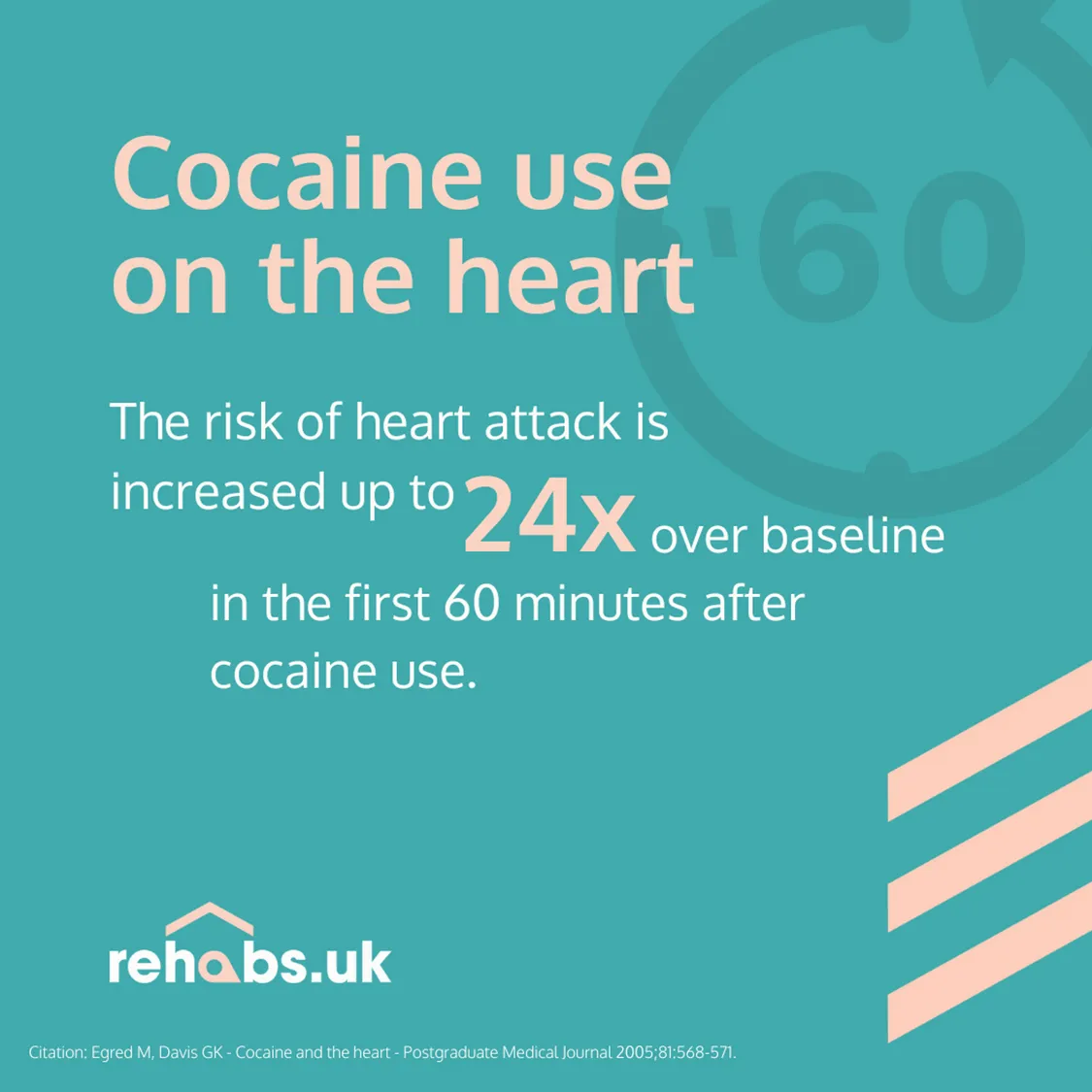04 Nov 2022
This page was reviewed by Lester Morse, Director of Rehabs UK & East Coast Recovery in October 2022.
There are many different signs and symptoms of cocaine addiction. Some that may be obviously to many and some that perhaps aren’t as widely known. With cocaine use continuing to rise it is important to be able to recognise these.
According to Office of National statistics drug-related deaths in England and Wales have risen 76.88% since 2010 (from 2,747 in 2010 to 4,859 in 2021), while cocaine-related deaths have risen 483.33% (from 144 to 840).
The difference between the signs and symptoms
In the medical world, a sign is a health issue that can be observed. A symptom is the subjective experience of a potential health issue, which cannot be observed by a doctor.
What are the first signs of addiction?
Behavioural
- Obsessive thoughts - Often individuals can’t stop thinking about the drug and how they can get their next ‘hit’. This becomes obsessive behaviour.
- Denial of addiction - Many individuals will deny they have an addiction and try to hide it so they can continue using the drug.
- Loss of control - The individual can lose all control of their behaviour. All they can focus on is the drug and their mannerisms have been affected by that. They cannot stop using the drug alone.
- Isolation from family or loved ones - Many people in addiction begin to isolate from loved ones. This could be because they have made new ‘friends’ who are also addicts. It could be because their loved ones have found out about their addiction or it could be that the drug has become their life and that starts to isolate the individual without realising.
Physical
- Weight loss - It is common for those who use cocaine to suppress their appetite which will cause them to lose weight.
- Dilated pupils - Drugs like cocaine can often dilate a person pupils. Someone who is on cocaine experiences a relatively short high of 15 to 30 minutes, though younger people and those more susceptible to the drug may be under the influence of cocaine for longer.
- Insomnia - Many individuals find it difficult to sleep once they use cocaine.
- Restlessness - Not being able to relax and be calm is another sign of addiction. Some people may be pacing around, tapping a pen or looking as though they are on edge.
- Increased energy – Cocaine can often increase a person’s energy. They might be more excited than unusual or speak quicker than normal.
These are only the most common signs of cocaine addiction. Each individual will be slightly different in the way they react with the drug.
The symptoms of cocaine use
There are many symptoms of cocaine use which can be split into two categories. Some of these are mentioned below:
Behavioural
- Confusion and disorientation – confusion and memory loss, difficulty focusing and making decisions, and become increasingly unable to think logically.
- Anxiety - Cocaine overstimulates the central nervous system causing anxiety. Individuals will start to experience the stimulation as nervousness, anxiety, and panic.
- Paranoia - When a person feels so physically certain of inherent danger, they naturally scan their surroundings for a reason, which makes them increasingly paranoid.
- Restlessness - Not being able to relax and be calm is another sign of addiction. Some people may be pacing around, tapping a pen or looking as though they are on edge.
- Violent behaviour – Often individuals using cocaine can react in a violent way. They can get irritated and lash out unexpectedly.
Physical
- Nosebleeds - Nosebleeds may often reoccur and become severe because cocaine destroys the membranes inside the nose.
- Shaking or tremors/Sweats or chills – some of the most common symptoms which can be spotted more easily.
- Depression – cocaine cannot keep the balance of chemicals in the brain and over time those chemicals change and depression can develop quickly.
- High blood pressure - When cocaine enters the bloodstream, it causes blood vessels to narrow and constrict, resulting in elevated blood pressure levels.
- Heart Health/ Heart attacks & Strokes - Cocaine use can cause heart attacks, particularly in individuals who have underlying heart disease or risk factors for heart disease.
- Lung health - Smoking cocaine can result in difficulty breathing, with numerous side effects that directly impact lung health.
These are some of the most common symptoms of cocaine use. It is vital to remember that each individual is different and can react and behave in many ways to cocaine.

How does cocaine affect the brain?
Addiction is a disorder of the brain’s reward system and illness or injury can affect this area of the brain. Mental health issues linked to brain chemistry can also impact on someone’s chances of developing a cocaine addiction.
Cocaine is psychologically addictive because it can produce an intense feeling of pleasure and a powerful ‘high’; a rewarding stimulus in parts of the brain which addicted individuals are compelled to replicate.
It is also physically addictive and becoming dependent upon it can happen so quickly it often takes those who use it by surprise. Tolerance begins to build after using it just once and, because this tolerance builds rapidly, addicted users can soon find that they are taking it in increasingly large amounts to achieve the same effect as the earlier experiences.
What does cocaine withdrawal look like?
Often the mental and physical symptoms of cocaine withdrawal mirror the opposite of its primary effects. So instead of the ‘high’ feeling of euphoria and boundless energy, users going through the process of withdrawal experience a low mood, lethargy and feelings of depression.
The length and intensity of your withdrawal from cocaine addiction will probably depend on how long you’ve been using the drug and how much you’ve been consuming.
According to Official Government reports, people starting treatment in 2020 to 2021 with powder cocaine problems decreased by 10% (from 21,396 to 19,209). This ends a rising trend over the last 9 years, which began in 2011 to 2012. However, it is important to address that although the number in treatment has reduced, the number of individuals using powdered cocaine on the whole is still continuing to rise.
Treatment is necessary to make a full recovery from a cocaine addiction. The body needs to learn to function without cocaine in its system and to that end there are lots of treatments for cocaine addiction available that may aid recovery. However, it is worth noting that there is currently no specific medication that will treat cocaine addiction, although there are some medications available that may help relieve the symptoms experienced during withdrawal.
Detox can be dangerous for some people, especially if you’re trying to withdraw on your own. It can be difficult to achieve full cocaine detox without support, so residential rehab is often the best setting for this.
How to help someone through cocaine withdrawal
The best way to help someone through cocaine withdrawal is to get them into a rehabilitation facility. This treatment option offers 24/7 care and support throughout the most difficult and challenging points of cocaine detox and withdrawal. With this type of treatment, it makes the probability of relapse much less.
However there are options to detox from cocaine at home via outpatient programmes if the individual is in good health. This option may be more convenient for some individuals and can work for many. However, without being supported and monitored 24/7 the chance of relapsing is higher.
According to Addictions.com the relapse rate for cocaine addiction is between 18 and 24% for individuals who complete a treatment programme, and approximately 90% for individuals attempting to recover on their own. Which highlights the importance and effectiveness of getting the individual suffering with cocaine addiction into a rehabilitation facility or involved in outpatient rehab.
Don’t wait to get support
Don’t wait to get support. By knowing the signs and symptoms you are more aware of cocaine addiction and how it can affect an individual. By being more alert, it can help you or your loved one face the challenges addiction creates head on. It's important to realise you don’t have to take the first step alone. Rehabs UK prides itself on giving the best professional and tailored advice, treatment options and support for those who need it. Do not hesitate to contact our fully-trained Treatment Advisors today!
